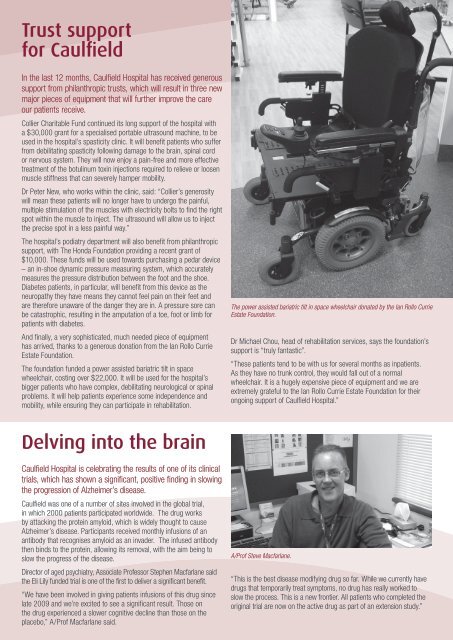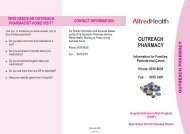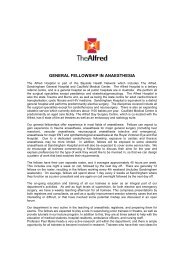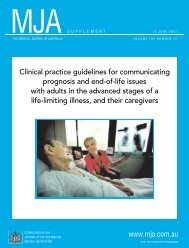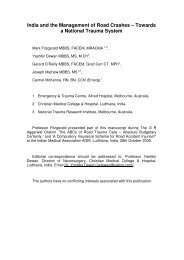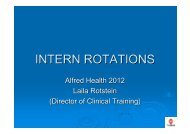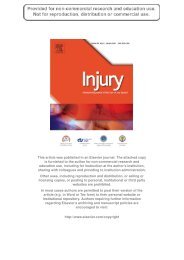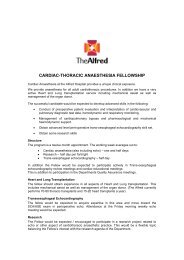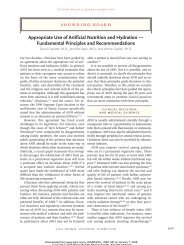New garden project open to all Exciting, new specialist unit
New garden project open to all Exciting, new specialist unit
New garden project open to all Exciting, new specialist unit
You also want an ePaper? Increase the reach of your titles
YUMPU automatically turns print PDFs into web optimized ePapers that Google loves.
Trust supportfor CaulfieldIn the last 12 months, Caulfield Hospital has received generoussupport from philanthropic trusts, which will result in three <strong>new</strong>major pieces of equipment that will further improve the careour patients receive.Collier Charitable Fund continued its long support of the hospital witha $30,000 grant for a specialised portable ultrasound machine, <strong>to</strong> beused in the hospital’s spasticity clinic. It will benefit patients who sufferfrom debilitating spasticity following damage <strong>to</strong> the brain, spinal cordor nervous system. They will now enjoy a pain-free and more effectivetreatment of the botulinum <strong>to</strong>xin injections required <strong>to</strong> relieve or loosenmuscle stiffness that can severely hamper mobility.Dr Peter <strong>New</strong>, who works within the clinic, said: “Collier’s generositywill mean these patients will no longer have <strong>to</strong> undergo the painful,multiple stimulation of the muscles with electricity bolts <strong>to</strong> find the rightspot within the muscle <strong>to</strong> inject. The ultrasound will <strong>all</strong>ow us <strong>to</strong> injectthe precise spot in a less painful way.”The hospital’s podiatry department will also benefit from philanthropicsupport, with The Honda Foundation providing a recent grant of$10,000. These funds will be used <strong>to</strong>wards purchasing a pedar device– an in-shoe dynamic pressure measuring system, which accuratelymeasures the pressure distribution between the foot and the shoe.Diabetes patients, in particular, will benefit from this device as theneuropathy they have means they cannot feel pain on their feet andare therefore unaware of the danger they are in. A pressure sore canbe catastrophic, resulting in the amputation of a <strong>to</strong>e, foot or limb forpatients with diabetes.And fin<strong>all</strong>y, a very sophisticated, much needed piece of equipmenthas arrived, thanks <strong>to</strong> a generous donation from the Ian Rollo CurrieEstate Foundation.The foundation funded a power assisted bariatric tilt in spacewheelchair, costing over $22,000. It will be used for the hospital’sbigger patients who have complex, debilitating neurological or spinalproblems. It will help patients experience some independence andmobility, while ensuring they can participate in rehabilitation.The power assisted bariatric tilt in space wheelchair donated by the Ian Rollo CurrieEstate Foundation.Dr Michael Chou, head of rehabilitation services, says the foundation’ssupport is “truly fantastic”.“These patients tend <strong>to</strong> be with us for several months as inpatients.As they have no trunk control, they would f<strong>all</strong> out of a normalwheelchair. It is a hugely expensive piece of equipment and we areextremely grateful <strong>to</strong> the Ian Rollo Currie Estate Foundation for theirongoing support of Caulfield Hospital.”Delving in<strong>to</strong> the brainCaulfield Hospital is celebrating the results of one of its clinicaltrials, which has shown a significant, positive finding in slowingthe progression of Alzheimer’s disease.Caulfield was one of a number of sites involved in the global trial,in which 2000 patients participated worldwide. The drug worksby attacking the protein amyloid, which is widely thought <strong>to</strong> causeAlzheimer’s disease. Participants received monthly infusions of anantibody that recognises amyloid as an invader. The infused antibodythen binds <strong>to</strong> the protein, <strong>all</strong>owing its removal, with the aim being <strong>to</strong>slow the progress of the disease.Direc<strong>to</strong>r of aged psychiatry, Associate Professor Stephen Macfarlane saidthe Eli Lily funded trial is one of the first <strong>to</strong> deliver a significant benefit.“We have been involved in giving patients infusions of this drug sincelate 2009 and we’re excited <strong>to</strong> see a significant result. Those onthe drug experienced a slower cognitive decline than those on theplacebo,” A/Prof Macfarlane said.A/Prof Steve Macfarlane.“This is the best disease modifying drug so far. While we currently havedrugs that temporarily treat symp<strong>to</strong>ms, no drug has re<strong>all</strong>y worked <strong>to</strong>slow the process. This is a <strong>new</strong> frontier. All patients who completed theoriginal trial are now on the active drug as part of an extension study.”


